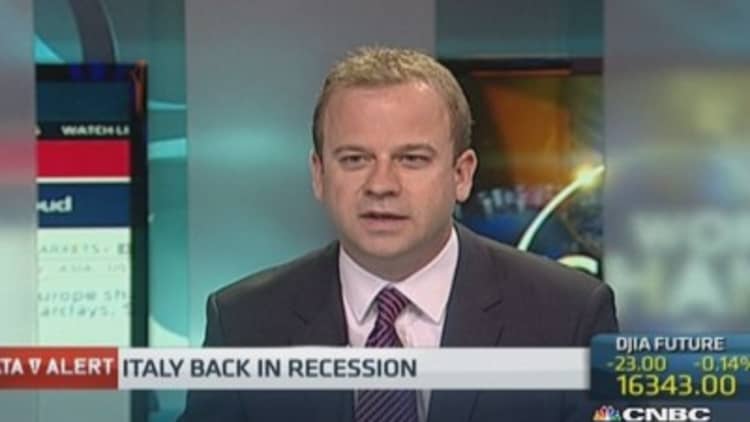Any brief respite at the start of the trading week looked increasingly like a "dead cat bounce" on Wednesday, with global investors continuing to shun riskier assets like equities.
Major stock indexes in the U.S. lost nearly 1 percent on Wall Street on Tuesday, with Asian stocks following them lower overnight. U.S. equities opened lower on Wednesday, extending losses that have the S&P 500 at two-month lows, but it was in Europe where the pain was felt most.
Major European bourses saw heavy selling with the German DAX trading lower by 1.05 percent by 3:00 p.m. London time. The Dax's intraday low earlier Wednesday marked a more-than 10 percent fall from its intraday high on June 20. Italian and Portuguese stocks were down well over 2 percent, and Greece's tanked nearly 4 percent in the morning session.
Meanwhile, spot gold rose 0.2 percent in morning trade and U.S. Treasurys climbed higher, with the yield on the 10-year falling to 2.4438 percent from yesterday's 2.483 percent.
'Never a bullish sign'
Amid concerns over sooner-than-expected interest hikes by the U.S Federal Reserve, it was actually tensions in Ukraine that set the tone on Wednesday morning.
Heavy fighting has erupted this week in a suburb of the eastern city of Donetsk, as government forces tried to take the area back from pro-Russian separatists. Meanwhile, Poland's foreign minister said on Tuesday that Russia was amassing battalion groups at the Ukrainian border, either to put pressure on the country or to invade it.
"20,000 Russian troops marching towards you is never a bullish sign," analysts at brokerage Capital Spreads said in a morning note. "It looks as though this dead cat bounce has reached its apex."
Read MoreGold rises as Ukraine tensions hurt equities
With the spotlight back on Ukraine once again, Europe's cyclical stocks were the worst hit in morning trade. These stocks – which are impacted by the strength of an economy - fell sharply lower with autos, the construction sector and retail leading the declines.
Bruising data from the euro zone added to the negative market sentiment on Wednesday. Factory orders for Germany surprised to the downside, with a plunge of 3.2 percent in June from the month before. Italy's economy, meanwhile, unexpectedly slid back into recession.
Read MoreGoldman calls time on Europe peripheral debt rally
"Germany is feeling the pain of the increasing tension, with the Bundesbank citing geopolitical concern as contributing to a probable stagnation of the economy in the second quarter of this year," Daniel Sugarman, a market strategist at ETX Capital, said in a morning note.
Banks weigh
Banking stocks from Europe's so-called periphery were also among the biggest losers on Wednesday, after slipping the day before. Traders cited concerns following the state bailout of Portugal's Banco Espirito Santo and what it could mean for other lenders. Upcoming stress tests from EU regulators were also adding to concerns about the health of some of Greece's lenders, according to Reuters, which cited two analysts.
Greece's Alpha Bank was trading lower by 10.7 percent on Wednesday morning, Bank of Piraeus was down 10.5 percent, Banco Comercial Portugues was lower by 8.8 percent and Banco Popolare di Milano lost 7 percent.

ETX Capital's Sugarman was unconvinced that concerns about Greece were solely related to the banking sector, however. He said that an announcement earlier this week about a possible withdrawal of funding from the so-called "Troika" of international lenders was also weighing.
"Though this might be popular with Greeks who resent the current level of external control of economic reforms, the market reaction suggests that this news is being viewed with a degree of trepidation in some quarters," he told CNBC via email.
Read MoreWhy an aggressive Russia scares markets most
Nicholas Spiro, managing director at Spiro Sovereign Strategy, said he believed that European equities could be in for more weakness in the near future as investors still harbor "serious concerns" about Europe's single currency area - despite sentiment that has been, until recently, quite favorable.
"The moment sentiment starts to deteriorate - and a loss of confidence in the conduct of U.S. monetary policy is the most likely trigger - these concerns are likely to resurface," he told CNBC via email.


